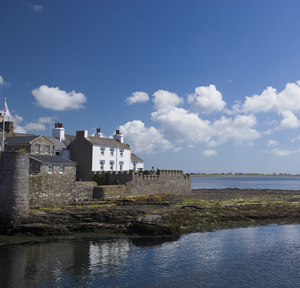Offshore
Isle Of Man Firm Hits Back Over Russian Oligarch Claims

A Russian billionaire investor in Silicon Valley businesses was, a news article claims, able to route his wealth via a trust, corporate service and fund administration company in the Isle of Man called Bridgewaters. The firm has denounced the article as deliberately misleading.
An Isle of Man-based trust, corporate services and fund
administration company called Bridgewaters has
described claims it is at the core of a “Russian money network”
as “intentionally misleading”.
Bridgewaters was mentioned in a Wall Street Journal
article on 25 October. The article said: “A Silicon Valley laser
start-up that went public in February had a surprising investor:
a Russian billionaire. The deal, routed through a series of
offshore companies and a venture fund, let the oligarch, Alisher
Usmanov, move more of his vast wealth into the West. The fund’s
stake at the IPO was valued at $175 million.
“The firm has helped structure a corporate empire for its clients
that has included investments in US technology companies such as
Meta Platforms Inc, Twitter and Airbnb Inc.; investment in a
company that allegedly sells surveillance equipment to the
Russian government and real estate around Europe.” The newspaper
cited documents it had reviewed.
The WSJ continued: “To trace the Russian assets, the
Journal scoured thousands of corporate documents, many made
public in recent years in major leaks of financial documents from
offshore services firms, including the Panama, Pandora and
Paradise Papers.”
With the treatment of Russians a high-profile issue in
know-your-client and anti-money laundering compliance since
Russia invaded Ukraine in late February, the way advisors and
firms handle such clients is a hot issue.
Bridgewaters emailed WealthBriefing about the article.
“The article gives an incomplete, often contradictory and
intentionally misleading picture of the true position. The
reporting does not make any allegation of wrongdoing; however, it
does insinuate that Bridgewaters has acted inappropriately or
unlawfully, this is categorically rejected,” the firm said.
“Bridgewaters takes its obligations as a regulated business very
seriously and we routinely and willingly extend our full
cooperation to any regulator or relevant competent authority
which requests information,” it continued. Bridgewaters had and
continues to have a diversified global client base, though we
have over the years had some Russian clients, along with clients
based in multiple other jurisdictions. Several the individuals
noted in the WSJ article were never engaged as clients
of Bridgewaters.
“With reference to the sanctions in place on individuals and
companies, Bridgewaters takes its reporting obligations extremely
seriously and strictly adheres to the restrictions in place in
all relevant jurisdictions. Where required, legal advice
has been sought and all relevant client matters are monitored
daily,” it said. “Following the introduction of Russia-related
sanctions, earlier this year, we have brought in additional
procedures and checks which are undertaken on all transactions
and payments to ensure we remain fully compliant.”
The business was established in 1996 and is licenced by the Isle
of Man Financial Services Authority.
WSJ claims
The newspaper said: “The reviewed documents don’t show that
assets moved out of Russia via the Bridgewaters network after
sanctions were levied. Instead, they reveal how Russian-linked
firms have been able to remain invested in Western companies,
despite a global crackdown.”
The WSJ quoted Bridgewaters saying it has acted
lawfully, and its new managing director, Mark Veale, who took
over in November, said the company has undergone a complete
overhaul recently and dropped several client relationships in the
past year. The news service said Veale declined to say which
ones, citing client confidentiality, or to disclose any specifics
about clients or deals.
“We haven’t been involved in evading sanctions,” Veale was quoted
as saying. “Nothing happens from this office with anyone who may
be subject to sanctions without all the appropriate
documentation.”
In its statement to WealthBriefing, Bridgewaters said:
“We are bound by client confidentiality, not only contractually,
but in accordance with General Data Protection Regulation (Data
Protection Act 2018 which follows the EU laws) and are committed
to compliance with all applicable global transparency and
reporting standards including FATCA/CRS/Beneficial
Ownership.”
“With the above in mind, and given the nature of the reporting,
we were unable to disclose anything relating to our clients, past
and present without their express consent. We note that many of
the matters raised in the article have already been covered
extensively in the Panama and Paradise Papers and other
reporting,” it said. The firm said the question of
Bridgewaters’ ownership arose in 2017 after the data theft from
Appleby Global’ s fiduciary business, which later became Estera
and latterly Ocorian.
The WSJ story said: “A British accountant, in a
conversation about business for Mr Usmanov, told a lawyer that
his Russian client `has now bought a trust company in the Isle of
Man (called Bridgewaters),’ according to the email, which was
first reported by the BBC. Mr Veale, the Bridgewaters managing
director, said the accountant, Richard Prosser, was mistaken. He
said that the two buyers of the firm that year were a corporate
services firm in Cyprus and a company in the Isle of Man owned by
Swiss banker Matthias Dieter Bolliger, and that they didn’t act
at Mr. Usmanov’s direction.
Bridgewaters, commenting on this segment of the report,
said: “Mr Usmanov did not buy Bridgewaters and he never owned or
controlled it. Despite Mr Prosser’s vague response to the
WSJ, he has previously confirmed he is aware of the
inaccuracy of his initial statement which created the lingering
doubts surrounding Bridgewaters’s ownership.”
The IOMFSA were fully informed of the ownership at the time of Mr
Bolliger and Mr Sergides’ acquisition of Bridgewaters, and we
have been in continual dialogue with them since,” it added.